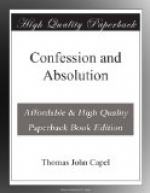This contrition or repentance does not mean a mere cessation from wrong doing, and starting anew in the way of goodness, drowning in the past the evil done. On the contrary, as by sin we turned our backs on God to go into a far-off country, to spend there our substance, so by contrition must we turn main, retrace our steps, and journey to that Father and home whence we departed. Hence is the process named conversion to God, just as sin is defined to be an aversion from God. Moses, expressing this thought, says: “When thou shalt be touched with the repentance of thy heart, and return to Him, the Lord thy God will have mercy on thee."[16] And still more explicitly does the prophet Joel declare: “Be converted to Me with all your heart, in fasting, and in weeping, and in mourning; and rend your hearts, and not your garments, and turn to the Lord your God: for He is gracious and merciful, patient and rich in mercy."[17] Again, the inspired Word says: “Cast away from you all your transgressions, by which you have transgressed, and make to yourselves a new heart and a new spirit; and why will you die, O house of Israel?"[18]
The Lord God, whom we have outraged by sin, knows no past. “I am who am,” is His name. In His holy sight, we who have sinned, and our transgressions, are ever abominable, unless we make to ourselves a new heart and a new spirit. “Be converted to Me, and I will be converted to thee,” are the words of Him who exercises on us His great mercy.
Holy Church, in her General Council assembled at Trent, defined this contrition or repentance to be “a sorrow of mind, and a detestation of sin committed, together with a determination of not sinning for the future”—“animi dolor, ac detestatio de peccato commisso, cum proposito non peccandi de catero."[19] Or, as the same Council says: “Penitence was indeed at all times necessary for all men who had defiled themselves with any mortal sin, in order to the obtaining grace and justice, * * * that so, their perverseness being laid aside and amended, they might, with hatred of sin and a pious grief of mind, detest so great an offence of God."[20] And, as the Roman Catechism explains, this means no mere feeling, but a genuine act of the will. A mother may show more sensible signs of grief at the loss of her only child than when sorrowing for sin, yet this is not in the least inconsistent with the most perfect contrition or repentance.
There are times when the intense sorrow for sin arouses the whole being of man: exciting not only the higher, but also the lower and sensitive part of his nature. St. Mary Magdalen, David, and many other great penitents, wept bitter tears of sorrow for their past wrongs. This, though a heavenly favor, is no necessary part of repentance. Indeed, it is possible to weep and to have sensible sorrow without having a contrite heart. The three essential elements in contrition are: hatred of past sin, grief at having sinned, and a determined purpose at all costs to avoid, in the future, sin and the occasions of sin. These emanate from the will of man, not from the feelings; they must be strong or intense enough to make the sinner prefer to endure any evil, or sacrifice any good, rather than again offend God, so infinitely good in Himself, and so infinitely good to man.




